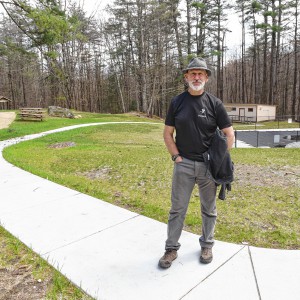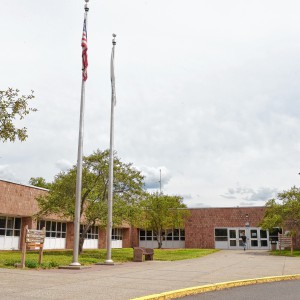Municipal officials call for boost in road, bridge money
| Published: 03-08-2023 6:53 PM |
BOSTON — Gov. Maura Healey checked off one long-unanswered priority for municipal leaders by proposing two years’ worth of road and bridge maintenance funding in a single bill, but after years of inflation, city and town leaders are worried this change alone will not be enough.
A string of local officials and Massachusetts Municipal Association higher-ups urged lawmakers on Tuesday to take the annual Chapter 90 bond authorization bill Healey filed (H 52) and bulk up its bottom line by at least 65%.
MMA Legislative Director Dave Koffman said state government has kept Chapter 90, the primary program used to reimburse municipalities for local road and bridge maintenance, at a $200 million-per-year allotment nearly every year since fiscal year 2012. In the decade-plus since then, Koffman said, construction and maintenance costs have swelled nearly two-thirds, cutting the purchasing power of $200 million down to the equivalent of $68.6 million.
“I’m sure some of that’s not a surprise. We know it’s not unique to local government nor unique to transportation funding, but it’s an important part of this consideration as we think about trying to increase this to a more adequate level for cities and towns,” Koffman told the Transportation Committee. “We’re so thankful to the administration for filing this bill, but we at the MMA are going to be requesting to increase this to at least $330 million per year for the two years proposed by Gov. Healey. Otherwise, cities and towns will continue to fall further behind each year.”
While Healey’s bill would authorize two years of bonds for the program, its $400 million in bonds would not change the annual amount from the level where it has sat almost every year since the Patrick administration.
According to data compiled by the MMA, state government tacked on $130 million in supplemental Chapter 90 dollars in FY15, $40 million in FY19 and $20 million in FY20, but otherwise has kept the program at $200 million every other year since FY12.
Last year, lawmakers and Gov. Charlie Baker supplemented the $200 million for Chapter 90 with an additional $150 million in grants for other transportation-related projects woven into the same bill, a fact Transportation Committee Co-Chair Rep. Bill Straus highlighted on Tuesday.
After Athol Town Manager Shaun Suhoski told the panel about how the neighboring community of Orange effectively needed to use four years of its state road and bridge aid to pay for the replacement of two bridges, Straus replied that the anecdote is “exactly why Chapter 90 is not your bridge program, or any other municipality’s.”
Article continues after...
Yesterday's Most Read Articles
“It’s not your major project program, and we shouldn’t pretend that it can become that,” Straus said. “No municipality in my view should be in a position where it’s taking four years of its Chapter 90 allocation, for which there are regular day-to-day demands, to fund a bridge repair. That is why, imperfect it may be because of the dollar amounts, that is why you have seen the Legislature move to more project-specific grant programs as build-upon for Chapter 90.”
Much of the advocacy municipalities lobbed at lawmakers Tuesday came from people who traded jobs on Beacon Hill for positions in city or town halls.
Melrose Mayor Paul Brodeur, who resigned from the House in 2019, told the Transportation Committee. “We need more to do more. We need more to do status quo.”
Fitchburg Mayor Stephen DiNatale, who served nine years in the House, said his community has 180 miles of roadway and 47 bridges that need maintenance. The amount Fitchburg receives in Chapter 90 funding would “allow the city to pave 1 mile of road at 3-inch grade and no sidewalk improvements,” he said.
“It doesn’t go far, does it, folks?” DiNatale said. “This is the principal reason our road-paving deficit falls further and further behind.”
The latest MMA survey of members found that cities and towns collectively need $715 million to bring all local roads into a state of good repair, Koffman said, noting that the state is not entirely responsible for addressing that gap.
Highway Administrator Jonathan Gulliver, who represented the Healey administration at the hearing, said the $400 million bond authorization for two years “helps keep us at historical levels of this program.”
Municipal leaders frequently pushed then-Gov. Baker and lawmakers to advance multi-year allotments for the program to no success.
“This two-year approach, that is new to Chapter 90 this year proposed by the governor, is the result of many conversations with cities and towns across the commonwealth who have very clearly communicated that a two-year approach gives them more certainty in the program and more flexibility, which enables them to develop longer-term roadway maintenance programs,” said Gulliver, who also served as highway administrator in the Baker administration.
Straus said at one point there is “much interest in the Legislature” in overhauling the formula used to distribute Chapter 90 funds to municipalities, though he did not offer details about what kind of changes lawmakers would pursue. He asked Gulliver if action this year would upend the two-year authorization.
Gulliver replied that the administration is prepared to provide any technical assistance needed to update the formula and that he would need to consult with other administration and finance officials about how to approach a possible “midpoint correction.”

 $427K to expand Camp Apex capacity in Shelburne
$427K to expand Camp Apex capacity in Shelburne With eye toward teaching firearm safety, Mahar’s Junior ROTC adding air rifles
With eye toward teaching firearm safety, Mahar’s Junior ROTC adding air rifles Franklin County Fairgrounds hosting regional dog agility competition
Franklin County Fairgrounds hosting regional dog agility competition Franklin County Technical School Honor Roll, Semester 1
Franklin County Technical School Honor Roll, Semester 1
